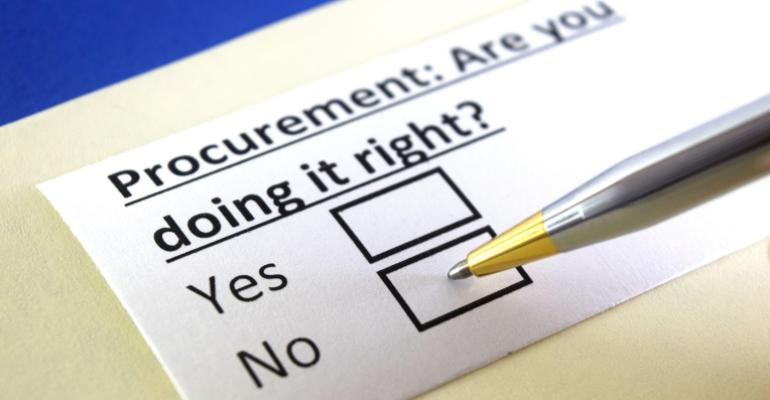Taking and embracing risks can pave the way for success in the business world, but in the realm of procurement, the reality of these actions can be very different. Every business inevitably encounters legal risks, but these can be further exacerbated when antiquated technologies and processes are in play.
By understanding complex legalities, the risks of using legacy technologies, and the abilities of digitally transformative procurement processes, organizations can reduce legal risks during procurement operations.
Navigating Legal Terrain
Most businesses must adhere to stringent regulations that are enforced across global and domestic markets.
For example, in the UK, organizations are held accountable by the Bribery Act 2010 and the Modern Slavery Act 2015.
The Bribery Act aims to combat bribery and corruption by criminalizing breaches, penalizing businesses found guilty of corruption, and holding them accountable to comply with the law.
Meanwhile, the Modern Slavery Act targets the prevention of human trafficking and forced labor by requiring supply chain transparency, the compulsory reporting of anti-slavery efforts by organizations, and enforcing non-compliance penalties.
Organizations operating within the U.S. must adhere to the Foreign Corrupt Practices Act 1977 (FCPA), which prohibits corrupt practices by companies and individuals both domestically and internationally if they involve U.S. persons and businesses.
The law includes anti-bribery and accounting provisions that allow the enforcement of penalties, fines, disgorgement of profits and imprisonment.
A similar law exists in the EU, and new legislation has been proposed to update existing bribery and corruption laws by increasing corruption prevention measures, expanding the definitions of criminal corruption, introducing minimal penalties, and extending the statute of limitations.
The EU also requires procurement departments to adhere to the Public Contracts Directive 2014/24/EU, which regulates public procurement procedures to ensure supply chain transparency by outlining rules about awarding public contracts.
The Illusion of 'Plausible Deniability'
Communication between procurement departments and suppliers that lack visibility and transparency cannot serve as a credible defense of plausible deniability when legal risks arise.
Within procurement, plausible deniability is the ability to deny any involvement in illegal or unethical activities because there is no clear evidence to prove complicity.
However, in the procurement landscape, this notion is largely considered a myth due to the emphasis on transparency, accountability, and regulatory compliance in the industry.
Procurement professionals are well-versed with these stringent regulations, and therefore issues like conflicts of interest, irregular practice, and lost communication make it difficult for businesses to prove innocence with plausible deniability.
To mitigate legal risks and non-compliance, procurement teams must prioritize supply chain and communication transparency by providing clear documentation, disclosure of key terms, fair treatment of all suppliers, and adherence to legal and ethical standards and legislation.
In doing so, organizations can ensure accountability and ethical conduct, which will reduce the likelihood of legal challenges.
Legal Vulnerabilities of Email Procurement
Technological advancements and global connectivity have transformed the procurement landscape, and clinging to antiquated methods can cause operational setbacks and legal vulnerability.
High volumes of data are analyzed, shared, and stored during the procurement process, and outdated procurement methods like email-based practices can significantly hinder efficiency, transparency, and data accuracy, which will heighten legal risks.
Reliance on paper-based and manual procedures is also time-consuming and error-prone, which further hampers efficiency and compromises data accuracy. Furthermore, outdated procurement processes make it difficult to harness the power of data analytics and intelligent insights, which are invaluable for optimizing procurement strategies.
Mitigating Legal Liabilities with E-procurement
Businesses can leverage e-procurement to mitigate legal risks associated with traditional email-based communication by streamlining operations with one transparent and auditable digital platform.
Digitalizing the procurement function ensures compliance with legal and ethical standards and reduces reliance on scattered email exchanges, which can leave businesses vulnerable.
Organizations should provide a clear audit trail to enhance supply chain transparency, but also streamline RFx, supplier discovery, contract negotiation, management, and reporting.
E-procurement platforms often include features like automated workflows, approval processes, and electronic signatures. They can also flag issues early on to allow quick risk mitigation and intervention that ensures procurement activities align with regulations and internal policies.
Tools like this facilitate real-time data analysis and reporting, allowing businesses to identify trends, monitor supplier performance, and detect irregularities that may be considered a compliance breach.
Jack Macfarlane is CEO of DeepStream.





